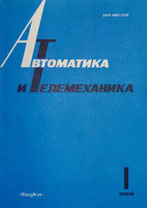|
This article is cited in 7 scientific papers (total in 7 papers)
Optimal control of maximum output deviations of a linear time-varying system on a finite horizon
D. V. Balandina, R. S. Biryukovb, M. M. Koganb
a Lobachevsky Nizhny Novgorod State University, Nizhny Novgorod, Russia
b Nizhny Novgorod State University of Architecture and Civil Engineering, Nizhny Novgorod, Russia
Abstract:
The maximum output deviation of a linear time-varying system is defined as the worst-case measure of the maximum value of the output Euclidean norm over a finite horizon provided that the sum of the squared energy of an external disturbance and a quadratic form of the initial state is $1$. Maximum deviation is characterized in terms of solutions to differential matrix equations or inequalities. A modified concept of the boundedness of the system on a finite horizon under an external and initial disturbances is introduced and its connection with the concept of maximum deviation is established. Necessary and sufficient conditions for the boundedness of the system on a finite horizon are obtained. It is demonstrated that optimal controllers (including the multiobjective ones that minimize the maximum deviations of several outputs) as well as controllers ensuring the boundedness of the system can be designed using linear matrix inequalities.
Keywords:
maximum deviation of output, linear time-varying system, generalized $H_2$-norm, linear matrix inequalities.
Received: 13.07.2018
Revised: 05.09.2018
Accepted: 08.11.2018
Citation:
D. V. Balandin, R. S. Biryukov, M. M. Kogan, “Optimal control of maximum output deviations of a linear time-varying system on a finite horizon”, Avtomat. i Telemekh., 2019, no. 10, 37–61; Autom. Remote Control, 80:10 (2019), 1783–1802
Linking options:
https://www.mathnet.ru/eng/at15364 https://www.mathnet.ru/eng/at/y2019/i10/p37
|

| Statistics & downloads: |
| Abstract page: | 270 | | Full-text PDF : | 34 | | References: | 34 | | First page: | 21 |
|




 Contact us:
Contact us: Terms of Use
Terms of Use
 Registration to the website
Registration to the website Logotypes
Logotypes








 Citation in format
Citation in format 
